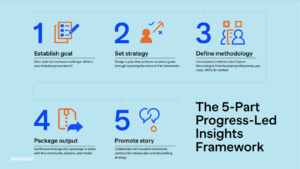Laying the groundwork for collective action
Market research is a powerful tool when it comes to making business decisions. Organizations rely on insights to determine which markets to enter, products to prioritize, and messaging to communicate. Organizations can also employ market research to drive change beyond their business and across industries. Research-backed thought leadership pieces can bring the voices of a community to light, give others a north star to follow, and spur change.
Social technology leader Meta recognized an opportunity to use research to do just that. It sought to increase awareness of a subtle but pervasive issue in the modern digital economy: data scraping. Data scraping, an automated way to access and extract data, has legitimate use cases but can also be harmful in the wrong hands—for both users and organizations. Data scraping is an issue that any company with a website or digital platform faces.
Meta knew that while a single organization could put measures in place to protect itself from data scraping, it would be more effective if the broader community could collaborate to solve the problem. A community of scraping detection and prevention experts across organizations would generate stronger best practices than any singular entity alone. With that in mind, Meta turned to research: first to understand the community’s perspective on data scraping, and then to identify any interest in collaborating on a solution.
Taking the pulse of 1,300+ experts
Meta commissioned NewtonX to conduct a research study on data scraping awareness and best practices. NewtonX Custom Recruited more than 1,300 professionals across industries: social media, commerce, gig economy, online dating, gaming, financial services, and IT services. These experts were involved in scraping detection and prevention and also accountable if their organization’s user data were scraped. By leveraging such a large sample of verified professionals with direct knowledge of the issue at hand, Meta could trust that the research would provide an accurate read on the community’s sentiment and efforts around data scraping prevention.
NewtonX used its Qual-Quant-Qual approach to capture both depth and breadth for this study. This research method allowed NewtonX to thoughtfully craft the survey design based on initial interviews, scale up the research, and do follow-up interviews to conduct deep dives with particular participants. NewtonX then analyzed the findings and extracted themes and insights, as a part of the 5-Step Progress-Led Insights Framework.

Moving the needle with research-backed thought leadership
The research study revealed that anti-data scraping awareness and efforts were varied. It also highlighted the desire to form a community around the issue of data scraping. Meta released these findings along with aggregated best practices for scraping prevention through a “Data Extraction Prevention Best Practices Study” whitepaper. This research report was shared with the community—including the research participants—and drove much-needed dialogue. Following this research and report, experts in the field have a shared awareness of the issue around data scraping and a starting point to work collectively toward preventing malicious data scraping. What started as a market research study from one organization has evolved into a community effort to solve an important industry-wide issue.


